L'infermiere di Tata/The nurse of Tata (Leopoldo Carlucci, 1916) is the final of the nine short silent films, which the Italian company Film Artistica Gloria produced, based on the nine stories in Edmondo De Amicis's book 'Cuore' (Heart). Star is the young Guido Petrungara, who plays the Cicillo, who thinks his father is dying in a hospital. Once again, Stabilimenti Alterocca in Terni published a series of sepia postcards to promote the film.
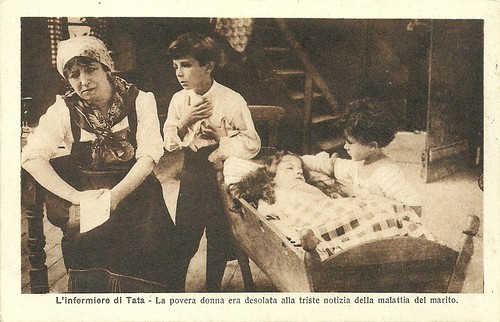
Italian postcard by Alterocca, Terni, no. 3419. Photo: Film Artistica Gloria, Torino. Publicity still for L'infermiere di Tata (Leopoldo Carlucci, 1916). Caption: The poor woman was desolate because of the sad news about her husband's illness.
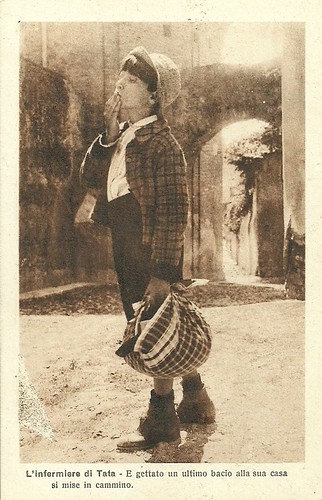
Italian postcard by Alterocca, Terni, no. 3380. Photo: Film Artistica Gloria, Torino. Publicity still for L'infermiere di Tata (Leopoldo Carlucci, 1916). Caption: After throwing an ultimate kiss to his house he went on his journey.
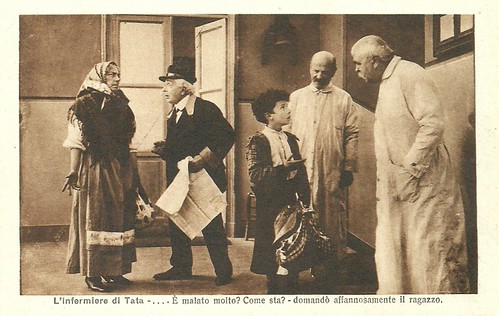
Italian postcard by Alterocca, Terni, no. 3379. Photo: Film Artistica Gloria, Torino. Publicity still for L'infermiere di Tata (Leopoldo Carlucci, 1916). Caption: Is he very ill? How is he?, the boy breathlessly asked.
The Italian silent film L'infermiere di Tata (Leopoldo Carlucci, 1916) is an adaptation of one of the nine short stories from Edmondo De Amicis' volume Cuore (1885). In Cuore, De Amicis tells about the life of nine boys in a school class in the city of Turin. Cuore is written in a diary form as told by Enrico Bottini, an 11-year-old primary school boy in Turin with an upper class background who is surrounded by working class school mates.
The stories are set during the Italian unification, and include several patriotic themes. The other boys are from various parts of Italy, giving a strong hint to the unity between the various regions of the Kingdom, both culturally as well as politically. The book was issued on 18 October 1886, the first day of school in Italy, and rose to an immediate success.
In 1915-1916, the company Film Artistica Gloria in Turin turned the stories of Cuore into a series of nine short silent films to support the war effort during World War I. In these shorts, the heroes are again nine young Italian boys who sacrifice themselves for their country and fight against the enemies at all time, even in distant wars.
L'infermiere di Tata (Leopoldo Carlucci, 1916) tells the story of the young boy Cicillo (Guido Petrungara). Because of a sad misunderstanding in a hospital, he attends to a agonising ill man, thinking he is his father.
The boy thinks of his poor mother and brother and sister, far away. Then his real father appears who embraces his son. The boy however doesn't leave the dying man and stays with him till he passes away.
Earlier in 1916, Guido Petrungara had also played Ferruccio in another part of the Cuore series, Sangue romagnolo/Blood from the Romagna (Leopoldo Carlucci, 1916). L'infermiere di Tata was his last film.
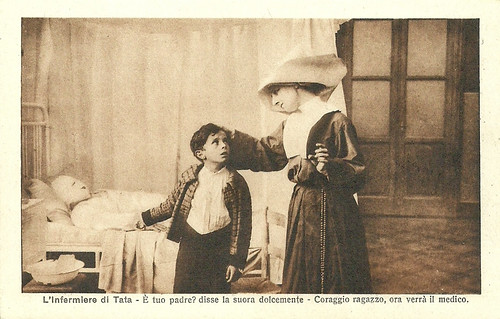
Italian postcard, no. 3378. Photo: Film Artistica Gloria, Torino. Publicity still for L'infermiere di Tata (Leopoldo Carlucci, 1916). Caption: Is he your father?, the nurse asked in a sweet voice. Have courage, boy, the doctor is coming now.
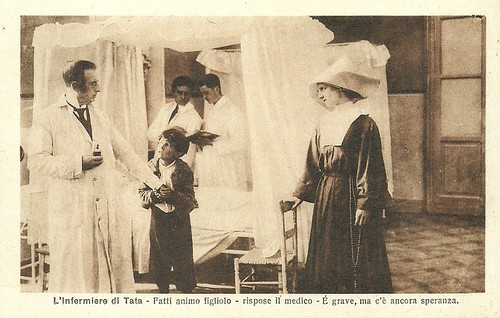
Italian postcard by Alterocca, Terni, no. 3377. Photo: Film Artistica Gloria, Torino. Publicity still for L'infermiere di Tata (Leopoldo Carlucci, 1916). Caption: Take heart, son, the doctor answered. It is serious, but there is still hope.
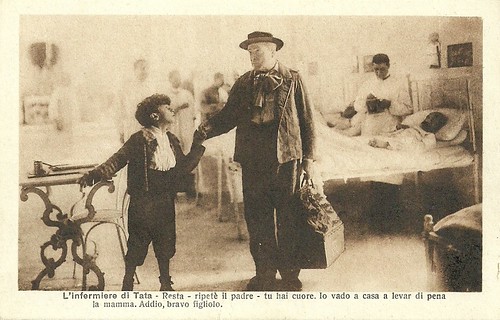
Italian postcard by Alterocca, Terni, no. 3376. Photo: Film Artistica Gloria, Torino. Publicity still for L'infermiere di Tata (Leopoldo Carlucci, 1916). Caption: Stay, the father repeated, because you have a heart. I am going home to relieve mother from her sorrow. Farewell, my dear son.
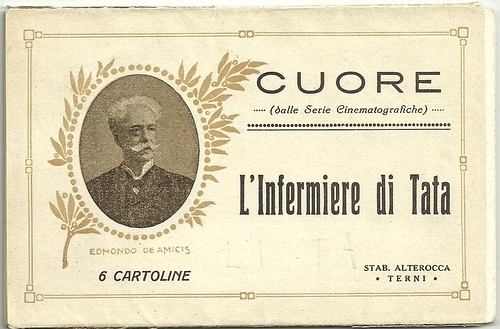
Italian edition by Alterocca, Terni. Cover of a series of 6 postcards on the Italian silent film L'infermiere di Tata (Leopoldo Carlucci, 1916), as part of the Cuore Series. Focus on the cover is on the author of the classic children's book, Edmondo De Amicis.
Sources: Wikipedia (Italian and English), and IMDb.

Italian postcard by Alterocca, Terni, no. 3419. Photo: Film Artistica Gloria, Torino. Publicity still for L'infermiere di Tata (Leopoldo Carlucci, 1916). Caption: The poor woman was desolate because of the sad news about her husband's illness.

Italian postcard by Alterocca, Terni, no. 3380. Photo: Film Artistica Gloria, Torino. Publicity still for L'infermiere di Tata (Leopoldo Carlucci, 1916). Caption: After throwing an ultimate kiss to his house he went on his journey.

Italian postcard by Alterocca, Terni, no. 3379. Photo: Film Artistica Gloria, Torino. Publicity still for L'infermiere di Tata (Leopoldo Carlucci, 1916). Caption: Is he very ill? How is he?, the boy breathlessly asked.
A boy with a heart
The Italian silent film L'infermiere di Tata (Leopoldo Carlucci, 1916) is an adaptation of one of the nine short stories from Edmondo De Amicis' volume Cuore (1885). In Cuore, De Amicis tells about the life of nine boys in a school class in the city of Turin. Cuore is written in a diary form as told by Enrico Bottini, an 11-year-old primary school boy in Turin with an upper class background who is surrounded by working class school mates.
The stories are set during the Italian unification, and include several patriotic themes. The other boys are from various parts of Italy, giving a strong hint to the unity between the various regions of the Kingdom, both culturally as well as politically. The book was issued on 18 October 1886, the first day of school in Italy, and rose to an immediate success.
In 1915-1916, the company Film Artistica Gloria in Turin turned the stories of Cuore into a series of nine short silent films to support the war effort during World War I. In these shorts, the heroes are again nine young Italian boys who sacrifice themselves for their country and fight against the enemies at all time, even in distant wars.
L'infermiere di Tata (Leopoldo Carlucci, 1916) tells the story of the young boy Cicillo (Guido Petrungara). Because of a sad misunderstanding in a hospital, he attends to a agonising ill man, thinking he is his father.
The boy thinks of his poor mother and brother and sister, far away. Then his real father appears who embraces his son. The boy however doesn't leave the dying man and stays with him till he passes away.
Earlier in 1916, Guido Petrungara had also played Ferruccio in another part of the Cuore series, Sangue romagnolo/Blood from the Romagna (Leopoldo Carlucci, 1916). L'infermiere di Tata was his last film.

Italian postcard, no. 3378. Photo: Film Artistica Gloria, Torino. Publicity still for L'infermiere di Tata (Leopoldo Carlucci, 1916). Caption: Is he your father?, the nurse asked in a sweet voice. Have courage, boy, the doctor is coming now.

Italian postcard by Alterocca, Terni, no. 3377. Photo: Film Artistica Gloria, Torino. Publicity still for L'infermiere di Tata (Leopoldo Carlucci, 1916). Caption: Take heart, son, the doctor answered. It is serious, but there is still hope.

Italian postcard by Alterocca, Terni, no. 3376. Photo: Film Artistica Gloria, Torino. Publicity still for L'infermiere di Tata (Leopoldo Carlucci, 1916). Caption: Stay, the father repeated, because you have a heart. I am going home to relieve mother from her sorrow. Farewell, my dear son.

Italian edition by Alterocca, Terni. Cover of a series of 6 postcards on the Italian silent film L'infermiere di Tata (Leopoldo Carlucci, 1916), as part of the Cuore Series. Focus on the cover is on the author of the classic children's book, Edmondo De Amicis.
Sources: Wikipedia (Italian and English), and IMDb.
No comments:
Post a Comment